Is Horse Meat Easy to Find in Mexico
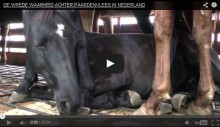 Most horses that are killed for the meat that is sold in Dutch supermarkets and snackbars have suffered under extremely cruel conditions. This becomes clear from a large international investigation conducted by Eyes on Animals together with Tierschutzbund Zürich (Switserland) and Animals' Angels USA.
Most horses that are killed for the meat that is sold in Dutch supermarkets and snackbars have suffered under extremely cruel conditions. This becomes clear from a large international investigation conducted by Eyes on Animals together with Tierschutzbund Zürich (Switserland) and Animals' Angels USA.
The Netherlands imports meat from almost 60.000 horses yearly from Argentina, Uruguay, Mexico, US and Canada. This horsemeat is sold to other countries, or used for various snacks, horse steak or smoked horsemeat. Supermarkets and snack producers mislead consumers and claim they maintain strict (EU) standards to guarantee the welfare of these horses. "Our investigation shows a completely different, horrible reality."
From March 2012 to January 2014, our animal welfare inspection teams were at the forefront where horses are exploited for meat production: at auctions, transports, collecting stations, export pens, borders, veterinary checkpoints, feedlots and slaughterhouses.
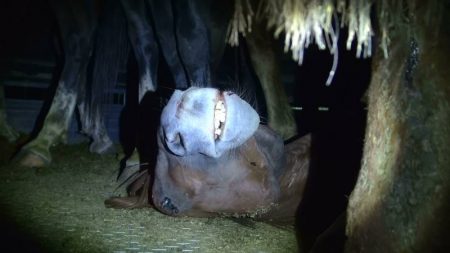
All places subject to our investigation have exhibited conditions where horses are suffering. They are beaten onto transporters, and injured or sick animals are left to die. Transport vehicles are inappropriate, loading ramps steep and the staff untrained. At the slaughter plants, the animals are set into a state of panic, the infrastructure is inadequate, and the horses are often not properly stunned. In Argentina, the situation is aggravated by the fact that horses are systematically stolen and sent to slaughter. Horse meat production procedures have been thrown out of joint partly by ineffectual supervisory and control systems; these are de facto "self-monitoring". In addition, the importing countries have no judicial or regulating influence on the production countries, limiting leverage options to written recommendations at best.
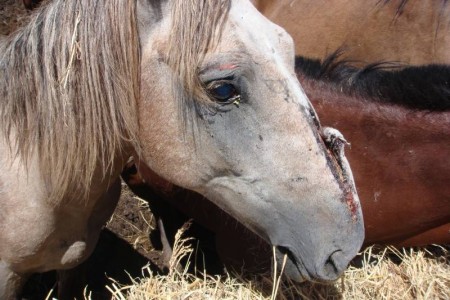 The results of these investigations show that the market is dominated by just a few import companies. Their statements regarding animal welfare and consumer protection stand in sharp contrast to reality. If these were to be believed the horses would not only live in great freedom, but their welfare would also be maintained, they would receive care, and would be kept in a specie-appropriate manner. Furthermore, the traceability of the animals would be guaranteed to the farm of origin, the transports would be humane, and the slaughter procedure free of suffering. However, the evidence our teams have gathered in Argentina, Uruguay, Mexico, the USA and Canada reveal a completely opposing picture.
The results of these investigations show that the market is dominated by just a few import companies. Their statements regarding animal welfare and consumer protection stand in sharp contrast to reality. If these were to be believed the horses would not only live in great freedom, but their welfare would also be maintained, they would receive care, and would be kept in a specie-appropriate manner. Furthermore, the traceability of the animals would be guaranteed to the farm of origin, the transports would be humane, and the slaughter procedure free of suffering. However, the evidence our teams have gathered in Argentina, Uruguay, Mexico, the USA and Canada reveal a completely opposing picture.
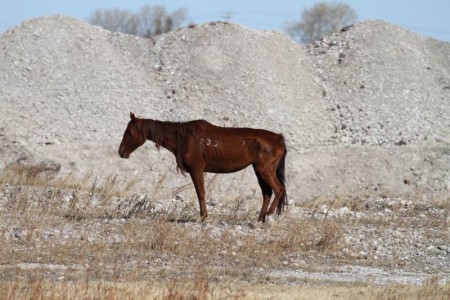 The investigation about horse meat import is jointly carried out between the TSB and the Animal Welfare Foundation (Germany), Animals' Angels USA, Eyes on Animals (Netherlands), GAIA (Belgium), L214 (France) as well as two Argentinean animal welfare organisations which have to remain anonymous for safety reasons.
The investigation about horse meat import is jointly carried out between the TSB and the Animal Welfare Foundation (Germany), Animals' Angels USA, Eyes on Animals (Netherlands), GAIA (Belgium), L214 (France) as well as two Argentinean animal welfare organisations which have to remain anonymous for safety reasons.
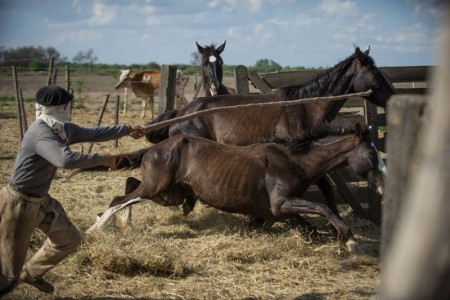 Horses are beaten onto transport trucks. In Uruguay and Argentina, agressive dogs are routinely used.
Horses are beaten onto transport trucks. In Uruguay and Argentina, agressive dogs are routinely used.
Netherlands is among the top-3 importers
Data from Eurostat 2012 show that the Netherlands is among the top-3 importers of horse meat in the EU. (Belgium 25.820 tonnes, France 16.908, Netherlands 6.871 tonnes). Of this 2.947 tonnes is from Belgium (this Belgium meat is actually from Mexico though, as Belgium (co-)owns slaughter plants in the Americas), 1.305 from Uruguay, 1.040 from Canada and 672 tonnes from Argentina. Eurostats datasets do not mention Mexico as export country. Howveer, Mexico's own data bureau INEGI shows an export of 3.500t to the Netherlands. Also, the Dutch import company Visser & Van Walsum states on its website that it owns its own slaughter plant in Mexico. This adds up to a total yearly Dutch import of over 61.000 horses (170 kilo of meat/horse). According to Eurostat the Netherlands exports 5.980 tonnes of horsemeat. A calculation learns that for the Dutch consumption, more than 26.000 horses are being brutally handled and killed.
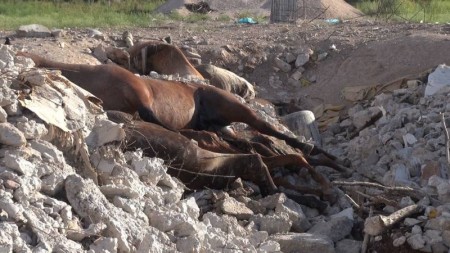 Call for a ban on the import of horse meat
Call for a ban on the import of horse meat
Eyes on Animals and our partner organisations call for a ban on the import of horse meat where production does not adhere to the EU animal protection standards. We support the standpoint that no horse meat shall be imported from countries with fundamentally different animal protection laws, as the importing countries cannot exercise legal influence on the holding-, transport- and slaughter-conditions. Consumers have a right to demand that animal welfare standards applicable in their countries must also be respected in the countries where the horse meat is produced.
Read the full EonA-Rapport "De wrede waarheid achter paardenvlees in Nederland"
English investigation material is available upon request: info@eyesonanimals.com
Source: https://www.eyesonanimals.com/investigation-horsemeat/
Enregistrer un commentaire for "Is Horse Meat Easy to Find in Mexico"